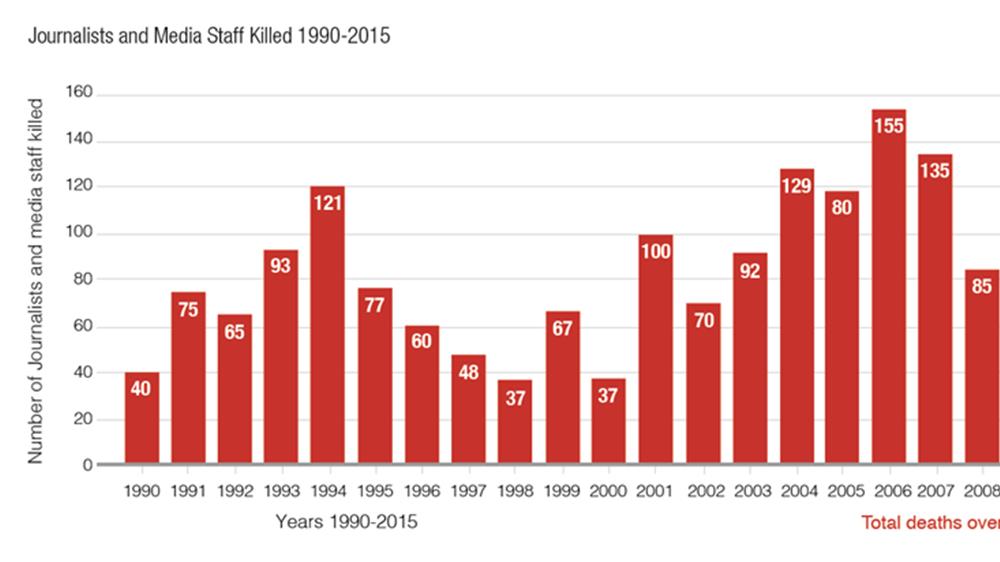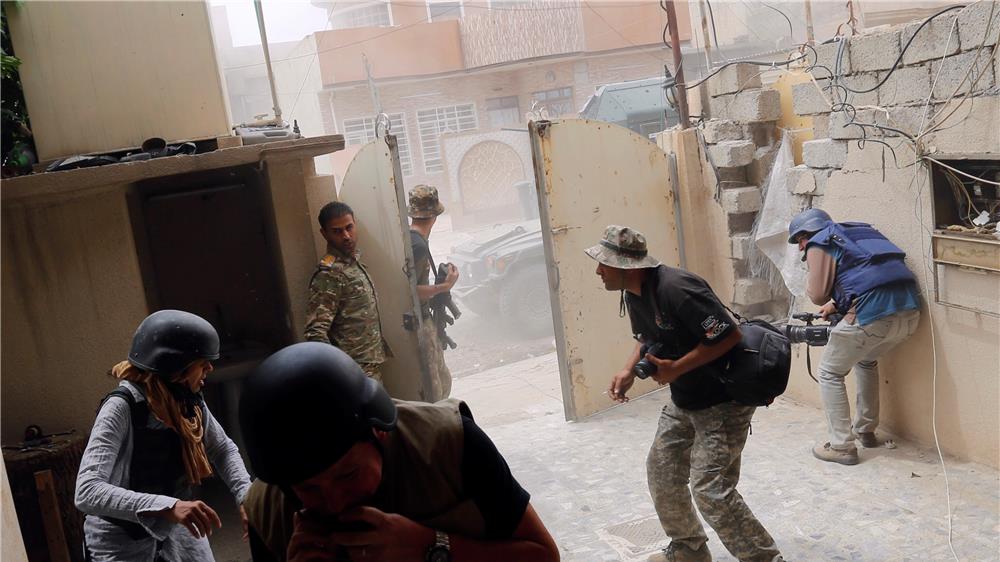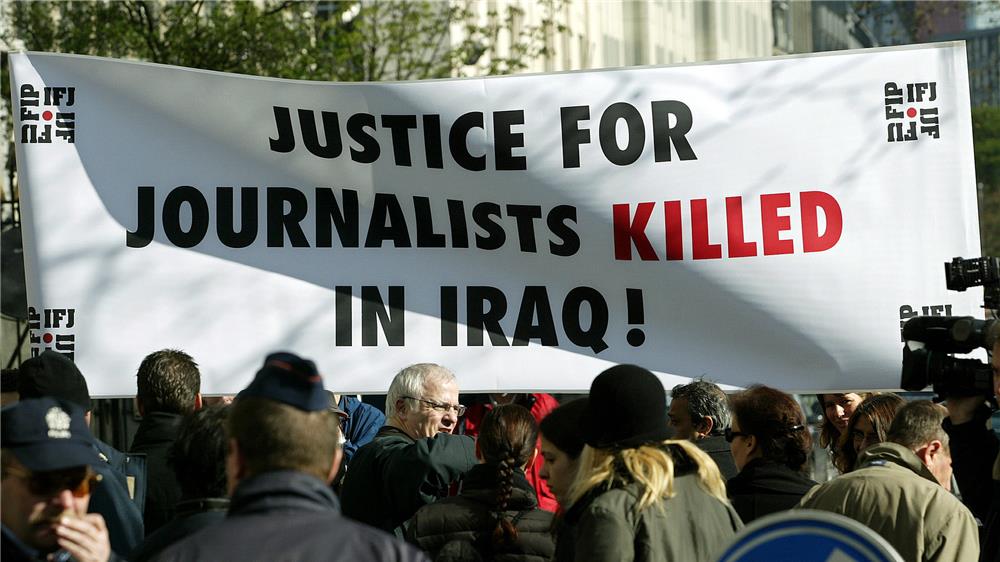يشير القطار بقرب الوصول إلى محطة "شومان" في قلب العاصمة البلجيكية بروكسل، هناك تأخذني الخطوات خروجاً نحو مركز المفوضية الأوروبية في الساحة الكبيرة التي حملت اسم "شومان بالاس"، حيث يقع مركز الاتحاد الدولي للصحفيين، وفيه ستلتقي "مجلة الصحافة" أنتوني بلايجر الأمين العام للاتحاد الذي يجمع تحت مظلته أكثر من 60 ألف صحفي حول العالم.
تحضرني الآن قائمة طويلة بأسماء وصور الراحلين مِن صحفيين قضوا خلال مهمات عديدة في عواصم ومناطق انتشرت على امتداد النقاط الساخنة في هذا العالم المفتوح على الأحداث اللاهبة، أسماء وصور احتلت لسنوات الصفحات الأولى لتقارير عالمية خاصة بحرية الصحافة، بينما ظلَّت حروفها عندما نتعاطاها -نحن الصحفيين- مجبولة بكثير من الألم والترقب لمصير مشابه.
لقاء في بروكسل
في الطابق الخامس من مبنى "ريزيدانس بالاس" يقع مقر الاتحاد الدولي للصحفيين، وفيه التقيت أنتوني بلايجر الذي تولى الأمانة العامة للاتحاد منذ العام 2015. ولد بلايجر في لومونس الفرنسية يوم 23 أغسطس/آب 1973، ودرس مراحله الأولى في مسقط رأسه غربي فرنسا قبل أن يدخل جامعة المدينة متخصصا في التاريخ القديم حيث أنهى البكالريوس عام 1992، ليتابع دراسته الأكاديمية في جامعة "أونجي" في اختصاص دراسة تاريخ القرون الوسطى منهياً درجة الماجستير عام 1998 والدكتوراه عام 2003. بدأ حياته الصحفية باكراً كمتطوع، حيث انتظم في العمل بمؤسسات متنوعة قبل أن ينضم إلى نقابة الصحفيين الفرنسيين ويبدأ حياته النقابية من خلال العمل في المنظمات الدولية، قبل أن تحط به الرحال نائباً للأمين العام للاتحاد عام 2014 ثم أميناً عاماً في 2015.
خلال مسيرته المهنية امتلك بلايجر اطلاعاً واسعاً على الواقع الصحفي في بلدان عدة بين الشرق والغرب، يتحدث بتفاصيل كثيرة تتعلق بأماكن زارها في العراق وفلسطين والمغرب وباكستان وغيرها. من زياراته المكوكية يستحضر التقارير العالمية الخاصة بالشرق الأوسط منذ سنوات، فسوريا والعراق هي الدول الأسوأ إطلاقاً بالنسبة للصحافة.. التضييق يشمل دولاً أخرى لا تخرجُ من قائمة طويلة تمتد عبر قارات ثلاث. 13% من سكان العالم ينعمون بصحافة حرة بينما يعيش نحو 46% في دول تنعدم فيها حرية الصحافة، ويبقى 31% لشعوب تتمتع بحريات محدودة بالنسبة للعمل الصحفي. يقول بلايجر إنه من الصعب الحديث عن هذه الأوضاع، وذلك لتعقيد الملفات الخاصة بالشرق الأوسط، لاسيما فيما يتعلق بالحكومات.
ليس التفكير في أن تكون صحفيا هذه الأيام بالأمر الهيِّن، في ظل تقارير صادمة تسلّط الضوء على الفترة بين عامي 1990 و2015. تتحدث هذه التقارير عن مقتل أكثر من 300 صحفي في العراق، و146 في الفلبين، و120 في المكسيك، و109 في روسيا الاتحادية، و106 في الجزائر، و95 في الهند، و75 في الصومال، و67 في سوريا، و62 في البرازيل، و56 في كولومبيا، و51 في رواندا، و48 في يوغسلافيا، و45 في أفغانستان، والأرقام في ازدياد.

بين ثنائيَّتين
في الحديث عن ثنائية حرية الصحافة والصحافة الحرة، أسأل الأمين العام للاتحاد الدولي للصحفيين عن مساعي الاتحاد في هذا الاتجاه ليقول: من خلال التجربة في القارة الأوروبية يمكنك أن تكون صحفياً حراً، لكن عليك العمل على وجود صحافة حرة.. هذه الثنائية خاضعة لجملة من القوانين والضوابط، هنا -بحسب بلايجر- يبرز ذكاء الصحفيين في التعامل مع الدكتاتور في سوريا واليمن والعراق مثالاً.. الرغبة في الصحافة الحرة عالية، لكن الإمكانيات محدودة وهذا ما رأيناه خلال السنوات السابقة. ومع انطلاق الربيع العربي لم يختلف الواقع أبداً هناك.. جهات كثيرة تتدخل في عمل الصحافة، دور الاتحاد الدولي للصحفيين يأتي من خلال تقديم الدعم للعديد من الجهات.. "نحن لا نملك أسلحة" يتابع بلايجر حديثه عن استراتيجية الاتحاد الدولي الذي يتخذ من عاصمة الاتحاد الأوروبي مقراً له، تلك الاستراتيجية قائمة على التدريب والتأهيل والدعم والمساعدة على خلق واقع صحفي صحي. طبعاً هذه الاستراتيجية واجهت العديد من العقبات، أهمها اختيار الشبكات التي يمكن العمل عليها، فضلا عن اختلاف النظرة إلى المستقبل بين الداعم والمدعوم الذي ينظر إلى أي مرحلة على أنها آنية حالية فقط، بينما يعمل الاتحاد على خطط طويلة المدى. من جهة ثانية، تبدأ الصعوبات عندما تنتهي المشاريع ويبدأ الصحفيون بالعمل على آليات جديدة، فيصطدمون بواقع صعب يحكمه الجمود، أو بصورة أخرى يحكمه البحث عن آليات عمل جديدة ضمن سقف الحريات المحدود.

فالمشاريع التي تولد نظراً للحاجة إليها، تؤسس -كما يراها بلايجر- لأرضية صلبة لكنها غير مستدامة بسبب محدوديتها الزمنية، لكنها في المقابل ترسم آفاقاً جديدة قوامها البحث عن فرص تخدم الواقع الصحفي. يعتقد بلايجر هنا أن الصحفيين الذين يؤمنون اليوم بأن الصحافة الحرة هي الباب الوحيد الذي يمكن العمل من خلاله للوصول إلى بيئة طبيعية مليئة بالإبداع، هم القادرون على التعامل بذكاء مع المحاذير التي تفرضها السلطات -أي سلطات- على العمل الصحفي.
ينظم الاتحاد الدولي للصحفيين العديد من الدورات المتنوعة التي يعمل القائمون عليها على تطوير مهارات العاملين في حقل الصحافة. من هذه الدورات مساقات جديدة في السلامة المهنية التي تم اعتمادها بإشراف مدربين دوليين محترفين.. يقول بلايجر إن ضرورات العمل الصحفي اليوم في أماكن الصراع والنزاع وتواجد الصحفيين في مناطق التوتر لنقل الأخبار حتَّم امتلاكهم أساسيات تتعلق بالتصرفات والسلوكيات التي تضعهم في مسافة أمان من الخطر، فالمساقات الجديدة التي تم طرحها تقوم على كيفية تعامل الصحفي مع حالات الاختطاف أو محاولات الاغتيال والتصفية، اختيار مكان الإقامة، التعامل مع الهجمات بالأسلحة المختلفة، بناء الملاجئ المؤقتة والدائمة، التخطيط للمهمات المتنوعة، وغيرها من التفاصيل الخاصة بالتغطيات في أماكن التوتر.. هذه الدورات المهنية نظمها الاتحاد في مصر واليمن ودمشق وغازي عنتاب وبيروت.

البحث عن آلية جديدة
يخوض الاتحاد الدولي للصحفيين إلى جانب بعض المنظمات الأخرى؛ جولات عديدة لاعتماد الإعلان الخاص بمبادئ حرية الإعلام في العالم العربي. وعن هذا يقول بلايجر إن هذه الجهود تُشكِّل في جوهرِها عملية المشاورات الإقليمية لتأسيس آلية إقليمية لحرية الإعلام على غرار آليات إقليمية مشابهة في إطار الاتحاد الأفريقي ومنظمة التعاون والأمن الأوروبي ومنظمة الدول الأميركية، هذا بالإضافة إلى الآلية الخاصة بالأمم المتحدة ومؤسساتها المختلفة، حيث يُناقش الإعلان المبدئي عن مبادئ حرية الإعلام، وهي المقترحات التي سيقوم عليها الأساس الذي ستُبنى به الآلية التي تتضمن 16 بنداً من ضمنها سلامة الصحفيين واستقلالية الإعلام العمومي ومناهضة خطاب الكراهية، فمعايير هذا الإعلان هو ما أضافت هذه الآليات لصحفيين في مناطق أخرى مثل أفريقيا وأميركا الشمالية و الجنوبية. وفائدة هذه المبادرة تكمن في خلق مظلة تنظيمية تشريعية جديدة تقوم على محاسبة الدول التي تنتهك حرية الصحافة في العالم العربي.
ويتابع الأمين العام للاتحاد الدولي للصحفيين حديثه بالقول: إن إدراك مدى أهمية تعزيز مفهوم الصحافة الحرة والجيدة، سيؤدي بالضرورة إلى خلق آليات تمكِّن وسائل الإعلام من الإسهام في تحقيق سيادة القانون على الصعيدين الوطني والدولي، فوسائل الإعلام -كما يراها بلايجر- تلعب دوراً محورياً وهاماً في إثارة التوتر أو نزع فتيله وتعزيز الحوارات واحتواء الصراعات.

الصحفي مواطن
يقر بلايجر بوجود الكثير من المصاعب في البلدان التي تشهد اضطرابات، خاصة للصحفيين الذين اضطروا لتغيير أماكن عملهم في بلدان أخرى وخضوعهم لقوانين البلاد الجديدة، وفي هذا الإطار يتواصل الاتحاد مع المنظمات الصحفية في هذه البلدان لإيجاد آلية خاصة للتعامل مع الصحفيين الذين يعانون في فضاءات البلدان الجديدة.
هذا التواصل يقودنا إلى الحديث عن جدلية الصحفي والمواطن الصحفي، فكيف يتعامل الاتحاد مع هذه المسألة؟ ليجيب ضيفنا بأن الصحفي مواطن بالدرجة الأولى، والمواطن الصحفي غير مقبول بالنسبة للاتحاد الدولي للصحفيين، فبإمكانك أن تمتلك حاسوباً في بيتك ولكن لن تكون مبرمجاً، وفي ذات الوقت بإمكانك امتلاك أجهزة غوص حديثة وهذا لا يعني أنَّك غواص.. الصحفي يخضع لمعايير عامة يجب أن تتحقق.
ويتابع ضيفنا "إما أن تكون صحفيا أو لا تكون، فعندما تقوم بعملك المهني وتبحث عن الحقيقة أو المعلومة ضمن إطار الأعمدة التي تقوم عليها الصحافة بمفهومها العملي والمهني، فهذا يعني أنك صحفي".








































